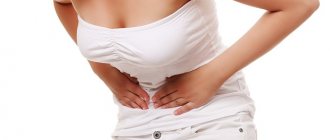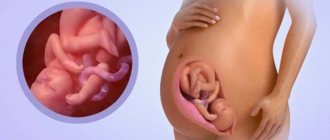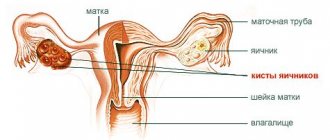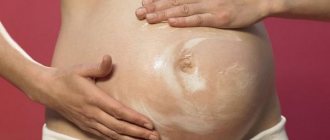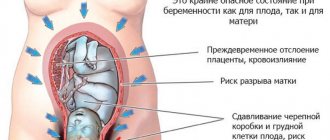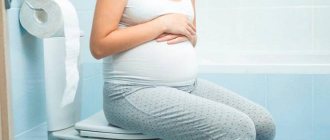What happens to the ovaries during pregnancy
When a woman is not pregnant, the ovaries are needed to produce sex hormones and mature eggs.
What happens to them during gestation?
The organ “falls asleep” so that new ovulation does not occur, and the eggs do not mature.
The corpus luteum
appears , producing 2 types of hormones - estrogens and progesterone. After existing for 12 weeks, the corpus luteum disappears and the placenta is formed. During pregnancy, blood circulation increases in the genitals. Due to this, the ovaries become larger and slightly change their location. Can they get sick and if so, why? The answer is in the next section.
Nature of pain
Pain in the ovaries can occur in any trimester of pregnancy. Discomfort may be felt if only the right ovary hurts during pregnancy or only the left one, or both at the same time. The pain can be dull, pulling, tingling, aching, cutting and jerking.
Nagging pain that occurs one-time or periodically is generally not dangerous.
Aching, incessant pain, especially in the first trimester, requires urgent consultation with a doctor.
Cutting or tingling, twitching pain in the area of both ovaries or only on one side indicate pathology.
Sharp unbearable pain in the iliac region with other symptoms (fever and abdominal tension) require calling an ambulance or immediately contacting a specialist.
Next, let's look at the reasons why the ovaries hurt during pregnancy and the accompanying symptoms.
Why do the ovaries hurt - possible causes
When pain appears in the lower abdomen on the left or right, you need to understand why it arose. The reasons may be varied.
Physiological
- Introduction of the embryo into the uterine mucosa.
From the very beginning of pregnancy, on the 7th day of fertilization, unpleasant sensations appear in the lower abdomen, reminiscent of pain before menstruation, due to the descent of the fertilized egg into the uterus with subsequent implantation. This is absolutely normal. - The appearance of stress on the ligaments of the uterus.
Over time, as the size of the fetus increases, the uterus also grows, causing the tissues that support it to tighten. Pregnant women think that the ovaries hurt, although in fact the discomfort in the lower and sides of the abdomen is caused by sprained ligaments. Pain occurs during physical activity, sudden movements, or even in a relaxed state, when a girl spends a long time on her side. - Number of pregnancies, age of the expectant mother.
Most often, pain in the lower abdomen appears in patients under 25 years of age and carrying a child for the first time. During subsequent pregnancies, expectant mothers hardly complain of discomfort in this area. - Changes in hormonal levels.
Under the influence of the restructuring, discomfort may appear, similar to pain in the ovarian area. - Corpus luteum cyst.
The condition is not considered a pathology: it occurs in the early stages up to 11 weeks. The formation appears in the place where the female reproductive cell emerged from the follicle. During gestation, the cyst enlarges, producing progesterone. When it reaches a large size, the formation stretches the ovarian capsule, creating discomfort and pain. Do not be alarmed by this condition: it does not affect the course of pregnancy. The cyst disappears along with the corpus luteum at the onset of the 12th week. - Artificial stimulation for IVF.
After in vitro fertilization, the expectant mother complains of tingling sensations and nagging pain in the lower abdomen in the area of the ovaries. - Relaxin production.
From 14 to 39 weeks of pregnancy, the expectant mother’s body produces the hormone. It helps facilitate the passage of the child through the birth canal and the divergence of the pelvic bones. Nagging pain may appear on the sides of the abdomen and in the lower back.
Pathological
During gestation, unpleasant sensations can be a manifestation of dangerous diseases in the expectant mother:
- Ectopic pregnancy.
This is an emergency condition that develops due to the attachment of the fertilized egg not to the uterine mucosa, but to another organ. The most common ectopic pregnancy is the fallopian tube. All signs of normal gestation appear. If a woman has taken the test, it shows a faint line, which may disappear when fertilization is re-determined. The disease is characterized by delayed menstruation, the appearance of cutting, acute pain in the abdomen at 5-6 weeks of gestation and is accompanied by red discharge or heavy bleeding. The embryo grows and may subsequently rupture the tube. - Inflammatory processes of the ovary - adnexitis, oophoritis.
Unpleasant sensations occur in the left or right side, lower abdomen or lumbar region, most often in the first or second trimester. Inflammation can be acute or chronic, with the latter considered more dangerous. During pregnancy, the disease makes itself felt, since a woman is most vulnerable during gestation. The development of the disease occurs as a result of a common cold, as well as when affected by sexually transmitted infections - chlamydia, mycoplasma, cytomegalovirus, fungus of the genus Candida. - Apoplexy.
During pregnancy, ovarian rupture occurs at the stage of formation of the corpus luteum. It is easily injured, sprouting new vessels. When a vessel is damaged, the blood forms a hematoma, which, increasing, ruptures the organ. The most common rupture of the right appendage, since it is better supplied with blood compared to the left. Apoplexy occurs due to heavy lifting, excessive physical activity, violent sexual intercourse, trauma, and pathology of the blood vessels of the appendage. - Rupture of an ovarian cyst.
In the early stages, the formation is characterized by a dull nagging pain in the right or left side. When it bursts, fluid escapes into the abdominal cavity. Severe, sharp pain, nausea and vomiting appear, and body temperature rises. An equally dangerous condition is considered to be torsion of the pedicle of the cyst, which also causes severe pain in the lower abdomen.
Watch a video on the topic of ovarian cysts during pregnancy:
Non-obstetric
Sometimes the feeling of discomfort in the appendage area is not associated with any disease in them.
Pathology of other organs occurs, and the pregnant woman believes that abdominal pain is associated with the ovaries:
- Indigestion.
During gestation, constipation occurs due to poor nutrition and non-compliance with the drinking regime. Also, problems with digestion are provoked by toxicosis: an aversion to many foods is caused with a malfunction of the gastrointestinal tract. After 30 weeks, the expectant mother’s body prepares for childbirth: progesterone is actively produced, relaxing the smooth muscles of the organs. At the same time, the hormone acts on the smooth muscle fibers of the gastrointestinal tract - the intestinal walls, the gallbladder. The woman is worried about belching, flatulence, a feeling of heaviness and discomfort in the abdomen. - Inflammatory diseases of the kidneys and bladder.
Pyelonephritis and cystitis are common causes of pain in the lower abdomen. - Acute appendicitis.
With pain in the right side, a pregnant woman may decide that her right appendage hurts. In fact, the appendix has become inflamed, and the woman urgently needs medical attention. If a pregnant woman has pain on her right side, she must be examined by a surgeon and a gynecologist.
Discomfort that is considered normal
The ovary can hurt during pregnancy for reasons that, although unpleasant, do not cause any particular harm to the body or, especially, to the fetus.
- If the period goes beyond the first trimester, the most likely reason that the left ovary hurts during pregnancy is a sprain, nothing more. In this case, discomfort manifests itself after long walks, mountain climbs or cycling.
- The right ovary hurts during pregnancy for the same reasons, and the pain can even alternate. And, finally, the real cause of such sensations is not the ovaries in general, but the ligaments that support the uterus, which grows very actively during pregnancy. This process is accompanied by a change in the position of the ovaries. A similar symptom appears if you lie on your right side for a long time. As a result, during pregnancy the left ovary may become ill.
- Ovarian pain in the early stages may be completely imaginary, i.e. be the result of the psychological state of the expectant mother. Expecting a child causes a weakening of the nervous system, and this can cause hypochondria, or permanent depression. Such an alarming state should not be ignored; it is fraught not only with uncomfortable sensations, but can negatively affect the development of the fetus. You should consult a specialist.
The general advice for such pain is to relax. If the pain goes away with changing body position or other relaxing activities, there is really nothing to worry about. However, if breathing exercises and exercises aimed at relaxing you have no effect, it’s time to ask a qualified specialist why your ovaries hurt while carrying a child.
Most often, pain occurs due to changes in the body of the expectant mother.
Problem caused by pathologies
The ovaries can hurt in the early stages of pregnancy, and often this is not dangerous. However, there are exceptions that may require an immediate response.
One of the main reasons why the ovaries may hurt during pregnancy is the inflammatory process. This diagnosis occurs if unpleasant sensations appeared before the conception of the child.
The most alarming thing is the fact that the inflammatory process can cause adnexitis, which is already dangerous for the fetus. In the worst case it is possible:
- abortion;
- premature birth.
For such diseases, it is better to undergo treatment before planning children.
A cyst is another common reason why the ovary may hurt during pregnancy, and the cyst itself does not pose a serious danger. The possible consequences are much more dangerous, including ruptures, torsions and suppuration. Tissue growth is the cause of painful sensations that have a “pulling” character, and unlike harmless pains, do not go away with relaxation.
The “pulling” sensation is caused by the pressure of the cyst tissue on other organs located nearby. This disease should be the reason for constant visits to a specialist.
Only a doctor can determine the exact cause of pain during pregnancy in the second trimester, so if relaxing techniques do not help, there is no need to panic. It is quite possible that in your case you are simply performing the necessary relaxation procedures incorrectly.
The reasons may be different
Methods of treating the disease
It is unlikely that you will be able to determine the nature of your illness on your own, so you should visit a doctor in any case. Despite the fact that the ovary during pregnancy can suffer from a number of symptoms that do not have serious health consequences, you should not risk the health of your baby.
Along with this, after detecting a number of other symptoms, you should consult a doctor immediately. Among them.
- Sharp pain.
- Regularity, which gradually increases.
- Pain in the coccyx, sacrum or lower back.
- Temperature increase.
- Bloody discharge.
- The pain is accompanied by general fatigue and increased fatigue.
Another reason to consult a doctor may be attacks of nausea, abdominal tension, or yellow or green discharge. In this case, you should not only consult a doctor, but also warn him about the detected symptoms.
Only a qualified specialist can prescribe appropriate therapy with medications, because many antimicrobial agents are prohibited for use while pregnant.
Often this is normal
Of course, the best option is planning a pregnancy and a full examination of both partners at this stage:
- exacerbation of the inflammatory process during pregnancy will require the woman to be hospitalized; in a hospital setting, she will be administered antimicrobial drugs intravenously, selecting the most effective and safe ones;
- very often, inflammatory processes that have been suffered are fraught with relapses, so a pregnant woman should change her lifestyle so as to protect herself and her baby to the maximum;
- Herbal medicine and gynecological massage are no less effective methods of therapy;
- if the cause of inflammation is pathogenic microorganisms that cause sexually transmitted diseases, then the expectant mother is advised to terminate the pregnancy.
With ovarian syndrome, you can cope with pain on your own. For this it is necessary.
- Keep calm.
- Avoid physical activity.
- Take a pain reliever.
- Avoid stressful situations.
- Eat well.
Traditional methods of treatment
There are many folk recipes that can be used when the ovaries hurt during pregnancy. Let's look at some of them.
- 1 glass of water;
- 15 juniper berries;
- to boil water;
- pour boiling water over the berries;
- leave for 4 hours.
- Take 1 tbsp. spoon 3 times/day.
- Duration of treatment – 1 week.
Decoction of goose cinquefoil:
- 2 glasses of water;
- 2 tbsp. spoons of goose cinquefoil;
- to boil water;
- pour boiling water over the grass;
- leave for about 1 hour.
- Take half a glass 3-4 times/day.
- Drink before meals.
Before using one of the above methods, you must consult your doctor. You may be prescribed complex therapy.
What to do if you feel pain
What can you do to prevent your ovaries from hurting? First, understand why the symptoms arose. Only a doctor can accurately determine the cause of the discomfort. That is why consultation with a gynecologist is a mandatory procedure. Even if a woman feels only nagging, mild pain, a visit to a specialist is necessary. If you ignore the symptoms, the threat to the health of the mother and baby increases.
In the early stages
If the discomfort in the abdomen is not severe, you can try to eliminate them yourself.
Doctors recommend doing the following:
- Take a comfortable lying position, try to completely relax until you feel better. If the cause of pain is nervous tension or fatigue, the symptoms go away with rest.
- Stop all physical activity, especially those that involve heavy lifting.
- Try to avoid stressful situations, don't be nervous.
- If abdominal pain intensifies or bloody discharge appears, do not tolerate it and call an ambulance immediately.
In the later stages
If you have an unpleasant feeling in the genital area in the later stages, do not panic.
After consulting with your doctor, you will receive valuable recommendations that you will follow:
- If the discomfort is associated with tension in the uterine ligaments, the expectant mother should apply a warm compress or something warm at a comfortable temperature, but not hot.
- Do moderate physical activity. It has a tonic and general strengthening effect on the female body.
- When the cause of nagging pain in the abdomen is indigestion, the first thing a pregnant woman should do is review her diet, eliminating harmful foods that cause gas formation and constipation.
Pain in the early stages
However, virtually every pregnant woman at one time or another may feel aching or nagging pain in the area of the ovaries. The pain is most noticeable in the early stages of pregnancy. Women should know that, losing their function for a while, the ovaries also change their location - they rise higher. Pain is felt exactly where it should be by nature. The conclusion suggests itself - the cause of pain is not in the ovaries, although the inflammatory process does occur.
Treatment with folk remedies
During gestation, the expectant mother is prohibited from taking many pharmaceutical drugs. Traditional medicine comes to the aid of a pregnant woman.
According to reviews from women on forums, “grandmother’s recipes” not only cope with painful sensations, but also do not harm the embryo. And yet, alternative medicine should be used only after consultation with a doctor. Some seemingly harmless herbal preparations can provoke contractions and miscarriage.
Proven recipes:
- Blueberry infusion.
To prepare, take 1 tbsp. l. raw materials, pour a glass of boiling water and leave for about half an hour. Drink the resulting drink ½ glass in the morning and evening. - Infusion of rose hips with black currants.
Take the fruits in equal proportions and pour boiling water over them. Infuse the drink for about an hour, then strain it and drink it instead of tea. Add a little sugar if desired. - Linden infusion.
Prepare a small handful of the tree's fruit. Pour 1 liter of boiling water over them, leave for about 15-20 minutes. Strain the product and take 1 tsp. 3 times a day. - Melissa infusion
. 4 tbsp. l. pour a glass of boiling water over the raw materials. Then leave the medicine to infuse for 1 hour. Strain and drink half a glass three times a day.
Before using them, be sure to consult with your doctor to avoid negative consequences on the mother and fetus.
Ovarian pain after IVF
IVF requires stimulation of the ovaries, which results in pain and discomfort. If a woman is diagnosed with polycystic disease before pregnancy, the symptom is more likely to appear.
If the pain is constant and very disturbing, this may indicate a threat of miscarriage, fading pregnancy, or exacerbation of chronic gynecological diseases. If suspicious signs appear, it is recommended to consult your doctor.
Prevention of the disease
Doctors say that the main measure to prevent any painful manifestations during gestation is planning a pregnancy. You should give up bad habits, promptly identify and cure diseases that, during pregnancy, can cause harm to the baby’s health. This is especially true for sexually transmitted infections. If the fallopian tubes have adhesions or synechiae, surgery will be required to cut them to prevent ectopic pregnancy.
It is necessary to observe a work-rest regime, avoiding overwork and fatigue. Experts allow moderate physical activity, but heavy lifting, heavy workload, and violent sexual intercourse should be completely excluded.
It is recommended to spend more time outdoors and eliminate any stressful situations. The expectant mother should eat properly, creating a balanced diet.
Pain as a symptom of ectopic pregnancy
If it is accompanied by other unpleasant phenomena, then the cause may be hidden in the pathological attachment of the fertilized egg. An ectopic pregnancy cannot develop normally, so it must be terminated, and the sooner the better for the woman, since the consequences will be minimal, and the prognosis for the future will be more favorable and optimistic.
Unpleasant sensations should be a reason to consult a doctor. The diagnosis of “ectopic pregnancy” can be confirmed using ultrasound.
